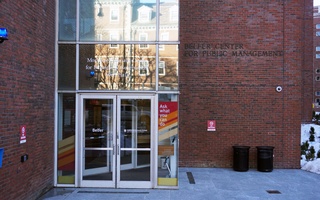The day after Kennedy’s address, over 300 students packed into Quincy House for a forum by government professor Henry A. Kissinger ’50 and associate professor of government Stanley H. Hoffman on the “Role of the United Nations in U.S. Foreign Policy.” But the majority of the discussion was driven by student questions on what was then called the “Cuban crisis,” as reported in The Crimson.
At the meeting, Kissinger and Hoffman openly expressed their opinions on what the Kennedy administration should do in the crisis and also provided context to the situation.
“There were a bunch of organized meetings where faculty spoke for or against [Kennedy’s action] and tried to explain what it was all about,” Freed said.
Each day, newspaper headlines revealed new actions by the Kennedy administration.
“As an onlooker I knew nothing more than what was in media and did have a sense of fear,” Stevenson said.
Tocsin seized the opportunity to educate students about the anti-nuclear effort. Gitlin said that Tocsin opposed the placement of missiles in Cuba but believed that that was not a legitimate reason to go to war.
“[Tocsin] wanted the Harvard-Radcliffe community to take seriously the risk of nuclear war,” Gitlin said. “We thought it was senseless and morally repellent to threaten mass destruction because there was a Communist government on an island in the Caribbean.”
Hampton P. Howell III ’63 recalled his first encounter with Tocsin activists in his freshman year, when he was confused by their rallies.
“I saw some people walking through the Yard with signs saying ‘End Nuclear War’, and I felt bad for them. They must not be good at sports and not have girlfriends because they didn’t have anything else to do,” Howell said.
Howell, who grew up in a small town in Long Island where he had not witnessed public demonstrations, said he later “learned differently” and became more aware of the possibility of nuclear warfare as the crisis manifested.
PRAISE FOR KENNEDY
The majority of students supported and praised Kennedy’s actions during the crisis.
“I thought he handled it brilliantly. That’s what a lot of people thought at time,” Freed said. “[Kennedy] had the right balance between caution and resolve.”
The Young Democrats and the Young Republicans had sent telegrams to Washington, expressing their support of the blockade, according to The Crimson.
Stevenson said that he and his peers at Harvard felt an “enormous sense of pride” because Kennedy was a graduate of the College and had recruited several Harvard graduates and professors to his administration.
Read more in News
At 'Cliffe And Graduate Schools, First Female Grads Blazed TrailsRecommended Articles
-
College Political Clubs Join in Fund DriveThe University's eight undergraduate political organizations have started a combined fund-raising drive to provide themselves with common secretarial services and
-
Tocsin News ForumHappily, this month's Tocsin News Forum shuns the strident, there's no time, brother tone which undergraduate writers on Berlin and
-
Students and Faculty Fight Nuclear TestsIn the spring of 1960, 1,359 members of the Harvard faculty signed a petition encouraging the Eisenhower administration to consider ...
-
 Ted Kennedy '54-'56 Went To The Senate In 1962, But Not With Harvard's Support
Ted Kennedy '54-'56 Went To The Senate In 1962, But Not With Harvard's Support -
 Harvard and the Atomic Bomb
Harvard and the Atomic Bomb













